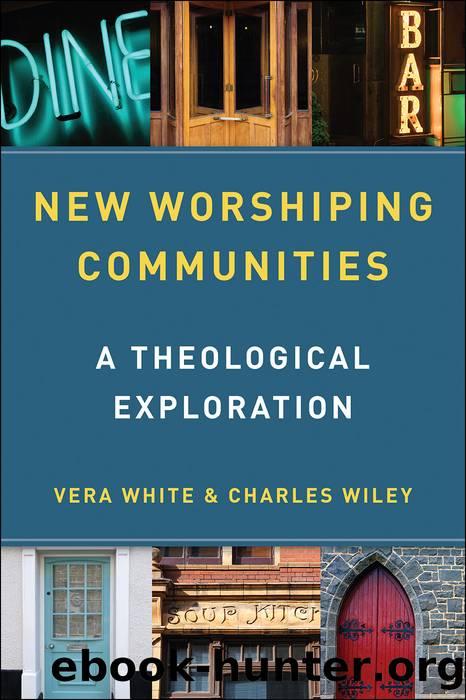New Worshiping Communities by Vera White & Charles Wiley

Author:Vera White & Charles Wiley
Language: eng
Format: epub
ISBN: 9781611648461
Publisher: Westminster John Knox Press
ADMINISTERED ACCORDING TO CHRISTâS INSTITUTION:
THE ROLE OF PASTORS
We also see in this vignette the importance of the pastor. One of the biggest hurdles for new worshiping communities around Word and sacrament is leadership, particularly around sacraments. Like many denominations, the Presbyterian Church (U.S.A.) has rules concerning who can celebrate sacraments within a congregation. That is, only a minister of the Word and Sacrament or a commissioned ruling elder (CRE) can celebrate at the Lordâs Table or baptize. Other denominations may use different terminology, but most have similar practices. In the case of the PC(USA), a CRE needs to have been elected as a ruling elder in a constituted congregation before serving as a CRE for another community. We have traditionally lifted up the role of teaching elder all the while affirming the possibility that any believer can proclaim the Word of God to a gathered communityâbut not so much with the sacraments. The language in the new Directory for Worship reads, âThe Lordâs Supper shall be authorized by the session and administered by a minister of Word and Sacrament,â but with the caveat that âthe functions described as belonging to teaching elders may be, in particular circumstances, also performed by ruling elders.â13
One of the questions before us in this project is how we continue to hold to this classic understanding of Word and sacrament in new worshiping communities. How do we propose that Word and sacrament be practiced in communities that do not have a theologically educated pastor who has been installed in the community?
But we are far from sixteenth-century France in time, distance, and culture. New worshiping communities are not growing on an isolated frontier but rather in the midst of a vast network of churches seeking to be faithful. The 1001 initiative emphasizes the connectional nature of the church in a relationship of âcare and accountability.â When new worshiping communities are unable to offer sacramental celebration due to the lack of ordained leadership, the wider church steps in to offer help. The nurturing relationship with a partner congregation or a midcouncil provides the oversight needed for the administration of baptisms and the Lordâs Supper. This is a relationship of mutuality in which the organized congregation absorbs some of the new life and energy of the new worshiping community while the new worshiping community leans on the rich history and tradition of its partner congregation.
Download
This site does not store any files on its server. We only index and link to content provided by other sites. Please contact the content providers to delete copyright contents if any and email us, we'll remove relevant links or contents immediately.
| Anglican | Baptist |
| Book of Common Prayer | Calvinist |
| Episcopalian | Inspirational |
| Lutheran | Methodist |
| Pentecostal & Charismatic | Presbyterian |
| Quaker | Seventh-Day Adventist |
| Shaker | Theology |
Angels by Billy Graham(1917)
How To Be Born Again by Billy Graham(1775)
Peace with God by Billy Graham(1679)
Unbroken Curses by Rebecca Brown & Daniel Yoder(1569)
God's Prophetic Symbolism in Everyday Life by Adam Thompson & Adrian Beale(1482)
The School of Biblical Evangelism by Ray Comfort(1425)
Call by Rick Joyner(1423)
Martin Luther: The Man Who Rediscovered God and Changed the World by Eric Metaxas(1385)
Power over the Enemy by John Osteen & Joel Osteen(1346)
Fresh Wind, Fresh Fire by Jim Cymbala(1231)
Jonathan Edwards: A Life by Marsden George M(1230)
Prayers That Bring Healing and Activate Blessings: Experience the Protection, Power, and Favor of God by John Eckhardt(1215)
Liturgy of the Ordinary by Tish Harrison Warren(1209)
The Supernatural Power of a Transformed Mind Expanded Edition: Access to a Life of Miracles by Bill Johnson(1195)
An Altar in the World by Barbara Brown Taylor(1191)
Unmasking the Devil: Strategies to Defeat Eternity's Greatest Enemy by John Ramirez(1189)
Reformation Theology by Littlejohn Bradford(1182)
Martin Luther by Mansch Larry D.; Peters Curtis H.;(1128)
Seeing the Voice of God: What God Is Telling You through Dreams and Visions by Smith Laura Harris(1123)
